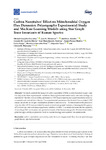Carbon Nanotubes’ Effect on Mitochondrial Oxygen Flux Dynamics: Polarography Experimental Study and Machine Learning Models using Star Graph Trace Invariants of Raman Spectra

Use este enlace para citar
http://hdl.handle.net/2183/20010Coleccións
- Investigación (FIC) [1615]
Metadatos
Mostrar o rexistro completo do ítemTítulo
Carbon Nanotubes’ Effect on Mitochondrial Oxygen Flux Dynamics: Polarography Experimental Study and Machine Learning Models using Star Graph Trace Invariants of Raman SpectraAutor(es)
Data
2017-11-11Cita bibliográfica
González-Durruthy, M.; Monserrat, J.M.; Rasulev, B.; Casañola-Martín, G.M.; Barreiro Sorrivas, J.M.; Paraíso-Medina, S.; Maojo, V.; González-Díaz, H.; Pazos, A.; Munteanu, C.R. Carbon Nanotubes’ Effect on Mitochondrial Oxygen Flux Dynamics: Polarography Experimental Study and Machine Learning Models using Star Graph Trace Invariants of Raman Spectra. Nanomaterials 2017, 7, 386.
Resumo
[Abstract] This study presents the impact of carbon nanotubes (CNTs) on mitochondrial oxygen mass flux (Jm) under three experimental conditions. New experimental results and a new methodology are reported for the first time and they are based on CNT Raman spectra star graph transform (spectral moments) and perturbation theory. The experimental measures of Jm showed that no tested CNT family can inhibit the oxygen consumption profiles of mitochondria. The best model for the prediction of Jm for other CNTs was provided by random forest using eight features, obtaining test R-squared (R2) of 0.863 and test root-mean-square error (RMSE) of 0.0461. The results demonstrate the capability of encoding CNT information into spectral moments of the Raman star graphs (SG) transform with a potential applicability as predictive tools in nanotechnology and material risk assessments
Palabras chave
Carbon nanotubes
Cytotoxicity
Mitochondria oxygen mass flux
Raman spectroscopy
Graph theory
Spectral moments
Cytotoxicity
Mitochondria oxygen mass flux
Raman spectroscopy
Graph theory
Spectral moments
Versión do editor
Dereitos
Atribución 3.0 España
ISSN
2079-4991






